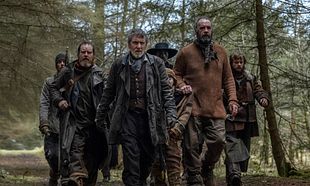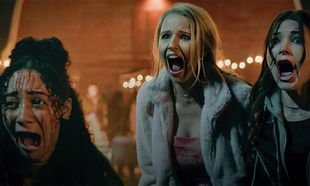Based on best-selling novel by Iréne Némirovsky, Suite Francaise is a solid if uninspiring war romance drama.
It's 1940 and the German forces advance unopposed through France. It’s not long before they reach a sleepy village where Lieutenant Von Falk (Schoenaerts) is billeted with well-to-do landlady Madame Angellier (Scott Thomas) and her daughter-in-law Lucile (Williams). Surprised that he’s not the gruff Nazi she was expecting, the lonely Lucile warms to the kind Von Falk and bond over a shared love of music and because, let’s face it, he has the same face and build as Mathias Scheonaerts. Romance blossoms with Lucile torn over her duty to her soldier husband, currently missing in action, and genuine love for her enemy.
Suite Francaise’s story from book to screen offers more drama than the plot itself. Written during the occupation, Némirovsky was arrested and sent to Auschwitz when she had completed only two of the proposed five parts (these two make up the film) that have only surfaced recently. There is drama present in this adaptation but it all moves too quickly and easily for it to be believable. Schoenaerts is not five minutes in the gaff without being given the glad eye by Williams, who once again plays the cheating wife as previous performances in Incendiary, Blue Valentine and Take This Waltz show.
In the hands of Saul Dibb, this should have fared a little better. His 2008 costume drama The Duchess dealt with another open secret affair but to greater success. The story there was tight, but this spreads itself too thin. There’s Margot Robbie’s peasant girl engaging in her own affair with a German soldier, there’s Sam Riley’s injured farmer who has to contend with the barbaric officer staying in his house, and there’s the mayor and his wife (Lambert Wilson and Harriet Walker), collaborators using the Germans to aid them in age-old grudges.
But the performances pull it through with Williams and Schoenaerts doing their level best to generate some heat in their snatched scenes. Kristin Scott Thomas, however underused, is imperial once again. And Dibbs does come up with some wonderful scenes - the plane attack on the civilian caravan and the obligatory checkpoint scene are eye-catching.



















































































